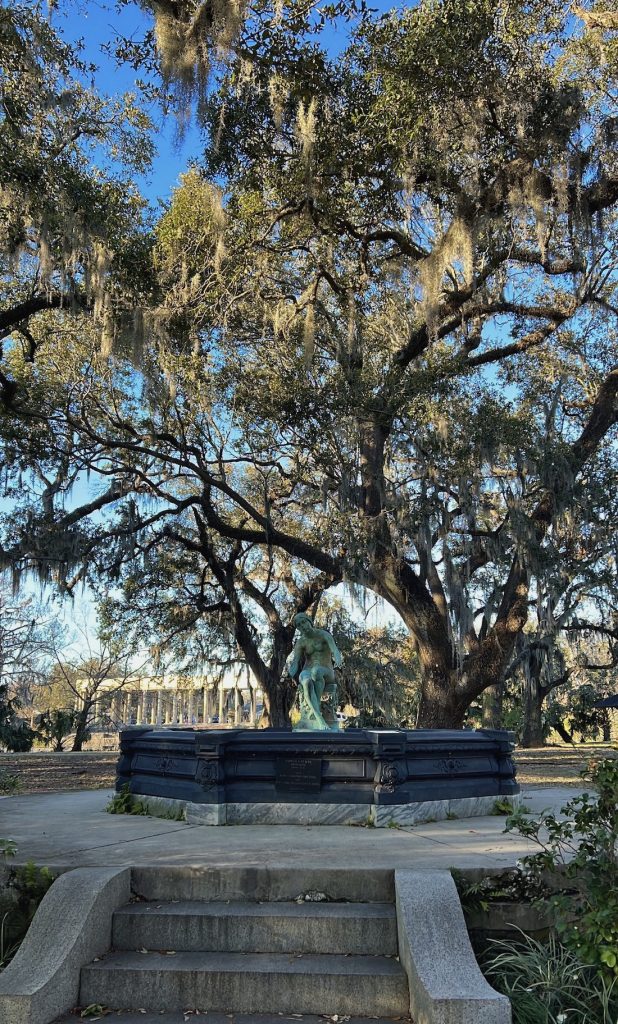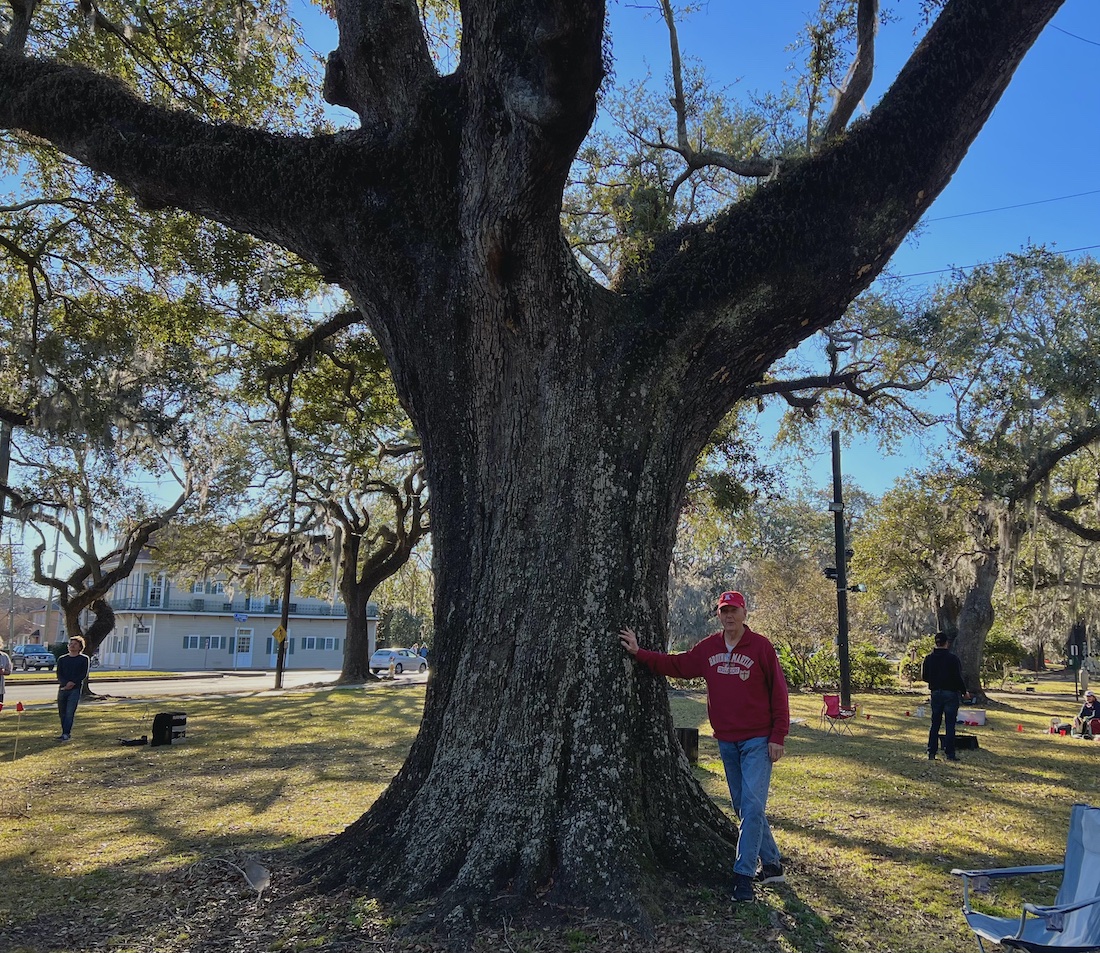By Diana Leane
Medill Reports
Deacon Joseph M. Clavijo sat in a camping chair under a sprawling oak tree in New Orleans’ City Park and marveled at the surrounding nature on a sunny Saturday afternoon in February. As young adults played lawn games and families walked through the grounds, Clavijo recalled how he found God’s presence in nature several years earlier by spending time in the park and reflecting.
Clavijo grew up in New Orleans’ Mid-City neighborhood and spent much of his time as a child around cement and chain-link fences. He didn’t have a real connection with the Earth, he said. Yet in the last few years, Clavijo has become an intermediary between environmental movements and churches in the Episcopal Diocese of Louisiana.
Faith-based organizations are playing an increasingly important role in the fight to mitigate and adapt to climate change and other environmental issues that are especially pressing in Louisiana’s vulnerable coastal areas.
“Humanity as a whole has become alienated from the Earth over the last several centuries,” Clavijo said. “One of the big things we have to do is find a way to reconnect where we are today with the Earth and the process.”
Clavijo, chair of the Environmental Commission for the Diocese of Louisiana, visits churches in the diocese to speak with rectors and members about environmental issues. He finds individuals interested in climate work.
Clavijo also meets with people of other belief backgrounds, like when he heads to City Park on free Saturday mornings to convene with a group of Gaians. In Gaianism, the Earth is a living being that should be protected, according to a website about the religious philosophy. Clavijo is also a member of the Greater New Orleans Interfaith Climate Coalition founded by the Rev. Gregory Manning in 2019.

Addressing climate change and bringing environmental concerns into their gathering spaces can be particularly challenging in a state heavily reliant on the oil and gas industry.
Louisianans face ongoing land loss on the coast caused in part by canals cut for oil and gas exploration, and more frequent and harsh storms and the destruction of wetlands linked to climate change.
The state loses an average of a football field of land each hour, according to a U.S. Geological Survey report. Coastal communities are still recovering from the damages Hurricane Ida brought when it made landfall as a Category 4 storm in August.
Meanwhile an industrial corridor that stretches 85 miles along the Mississippi River in the state has been called “Cancer Alley,” and a ProPublica investigation reported an estimated quarter of a million residents there are at elevated risk of cancer from the pollution.
Manning, pastor of Broadmoor Community Church in New Orleans, has long focused on environmental injustice, including pollution in Cancer Alley and the effects of climate change on vulnerable people. Through his work as an activist and community organizer, he sees how people on the frontline of climate issues in the state are also affected by environmental racism and injustice, he said. He created the interfaith coalition to address environmental injustices in 2019.
“I said something needs to be done. We need more than just me and maybe another clergy member out there,” Manning said. “We need clergy who are just unafraid to tell the truth about the poisoning and toxification of people within the state of Louisiana.”
The organization educates community members on climate concerns and how to reduce their carbon footprint, and tracks and lobbies on state legislation that affects environmental justice. Manning and the coalition have focused their attention on the permits the Louisiana Department of Environmental Quality is approving for petrochemical companies.
“We may not agree theologically or doctrinally on many issues, but on this issue that affects us all, in terms of the fact that if we don’t get this issue of the mitigation of climate change under control, nothing else is going to matter,” Manning said. “Let’s put aside our religious differences and come together to agree that we need to fight for God’s creation.”
Fighting for environmental justice
Clavijo joined the coalition’s steering committee, and the Rev. Jay Angerer of All Saints’ Episcopal Church joined the coalition as the chair of the policy committee. Angerer said Manning found a common cause that transcended different religious backgrounds.
“We can all get in the boat and row in the same direction because the coast is disappearing,” Angerer said. “Religious communities and their leaders have a voice in the community, and politicians have a voice, … and it would be remiss of us to not use that voice for something that really seems to affect and negatively impact people who don’t have a voice in society.”
Manning has publicly opposed plans for plastics and chemical companies’ plants in recent years.
In 2019 he was arrested in the hallway outside of the Louisiana Association of Business and Industry office — then in Chase South Tower in downtown Baton Rouge — while protesting against industrial pollution in Cancer Alley, including proposed plans for a Formosa Plastics Group petrochemical plant. The plant would’ve been built in St. James Parish, partially on an ancestral gravesite for enslaved people, Manning said.
“That’s our history. We were there,” Manning said. “How dare industry like Formosa come in and think that it’s all right to desecrate. As I always say, that land has been bought and paid for by the African descendants of slaves who gave their blood, sweat and tears on the sugar cane fields on that very same land for decades.”
The state would have allowed the plant to emit more than 800 tons of toxic chemicals, according to a Washington Post article. The site also would have been permitted to emit thousands of tons of pollutants linked to respiratory illnesses and more than 13.6 tons of greenhouse gases each year.
After years of environmental groups such as the Coalition Against Death Alley and RISE St. James protesting and fighting the plant plans, the U.S. Army Corps of Engineers announced it would conduct a more thorough review of the environmental impacts. The review could take more than two years, according to an Advocate article, and advocates say they hope it means the plant will never be built.
Manning said the effects of the plant would extend far beyond St. James Parish, affecting community members in New Orleans.
“Although it’s a 45-minute drive from here to there, we’re connected by the Mississippi River,” Manning said. “Any waste that that industry and facility would put into the water also affects us, the emissions that come in and go into the air also affects us. We’re trying to get our people to understand that.”
Getting companies to pay
Angerer said along with opposing state permits for polluting industry, the coalition promotes green jobs. The policy committee was involved in working on a constitutional amendment that would turn an executive order on Louisiana’s Industrial Tax Exemption Program into constitutional law.
Gov. John Bel Edwards signed the executive order in 2016, changing the exemption program so local governing bodies have to vote on whether companies can obtain property tax exemptions, and companies seeking exemptions have to demonstrate job creation or job retention. Enshrining the order in law would ensure more community control and benefits, and communities would “receive the tax money that they have been due,” Angerer said.
The bill for the constitutional amendment, SB151, was introduced in the 2022 legislative session and failed to pass the Louisiana state Senate.
“We firmly believe that that’s the reason why the education system in Louisiana is so poorly rated, is because it’s so underfunded,” Angerer said.
The Rev. Kristina Peterson, member of the coalition and facilitator at the Lowlander Center that addresses environmental issues surrounding climate adaptation, said there’s no justification for poisoning the environment, and that must be prevented from happening.
“All of what’s around us has a right to be healthy and live well,” Peterson said. She asked whether people can justify poisoning ecosystems for temporary profit now while harming future generations. “Are we going to turn over a poisoned Earth to them? It behooves us now to find different ways in which to modulate and to think of our own life and our lifestyle, to prevent that from happening.”
Peterson said the issues Louisiana faces extend beyond the state’s borders, and the rest of the country should wake up to the damage happening.
The state’s wetlands are a diverse ecosystem that hosts fisheries and wildlife. They purify water, protect against land loss, act as buffers for storms and shield thousands of miles of oil pipeline from exposure to open water, waves and other threats, according to Southeastern Louisiana University.
“Louisiana is on life support at this point where we’re the kidneys for the whole country,” she said. “We’re a sacrificial zone for the rest of the country for their lifestyle, and how people live elsewhere is on the backs of people here.”
Making an impact
Peterson said she’s excited about the work many other faith and community leaders are already doing across the country to address environmental issues. Rising Voices, a collective of Indigenous people from different parts of North America, is working on climate, and she’s seen small groups forming all over, she said. Climate justice has been talked about for a very long time, but people are now seeing the effects.
“People are starting to see the impacts and understand that it is not something that’s not outside of the realm, but inside the realm of experience on a daily basis,” she said. “More folks are willing to talk about it and do something about it.”
David Shepard, chair of the environmental action committee at Touro Synagogue in New Orleans, said he’s seen congregants eager to discuss environmental issues and help with outreach.
He said the synagogue supports communities, especially those who are coastal and Indigenous, and groups to meet their needs in addressing climate issues.
“Given the ways in which Jewish communities have been marginalized historically, (we) identify and partner with and lift up other communities that are marginalized,” he said. “It resonates with the Jewish community. It’s our role to partner with and support those other communities, as well.”
In the future, as climate-related issues increase, Shepard said he thinks religious leaders have the potential to leave an impact and educate people on climate.
“Faith leaders exercise a lot of moral authority, faith leaders occupy their positions because congregants have identified them as people who are able to speak to values,” Shepard said. “Because they occupy that position, and because they unite communities and serve communities, they hold power to engage with political leaders and community leaders.”
Diana Leane is an investigative journalism graduate student at Medill. You can follow her on Twitter at @DianaLeane.

